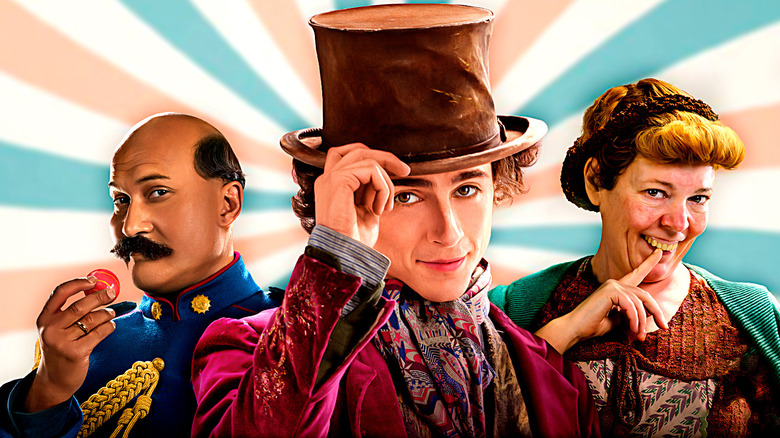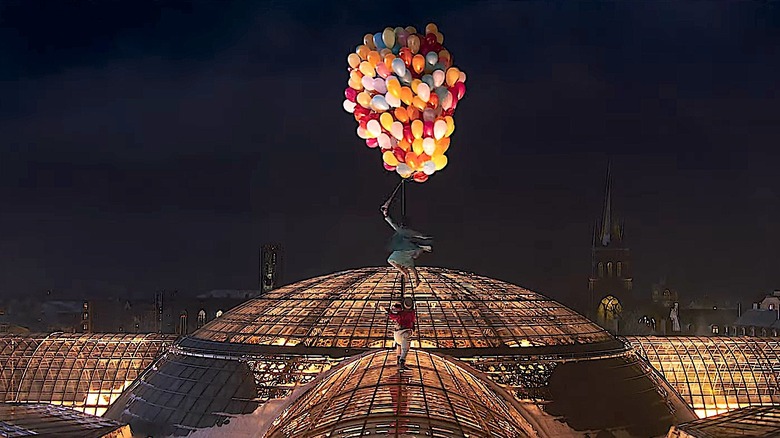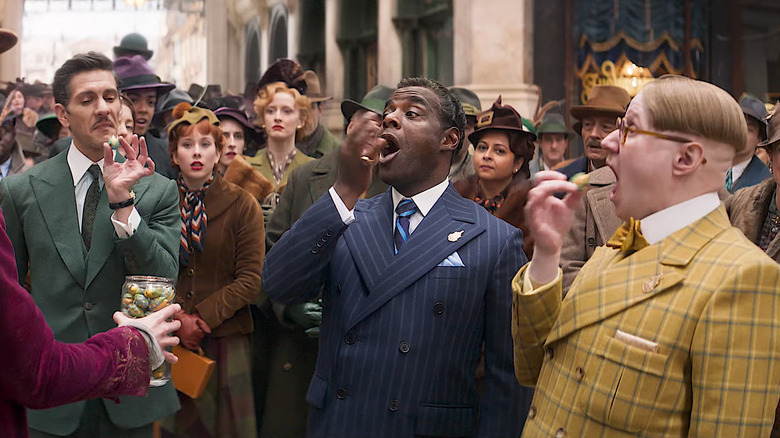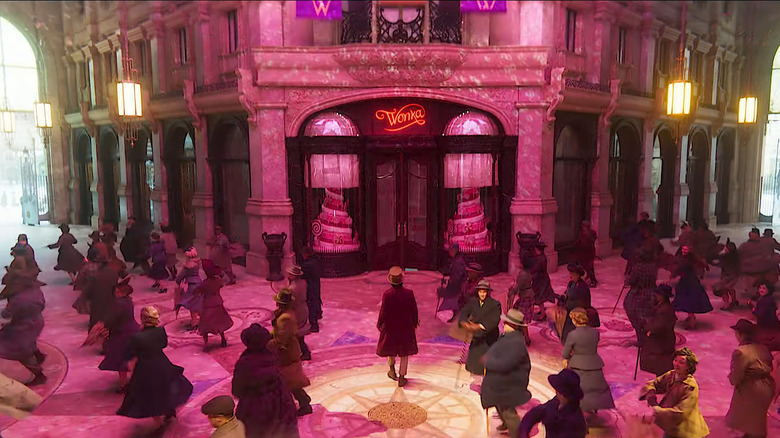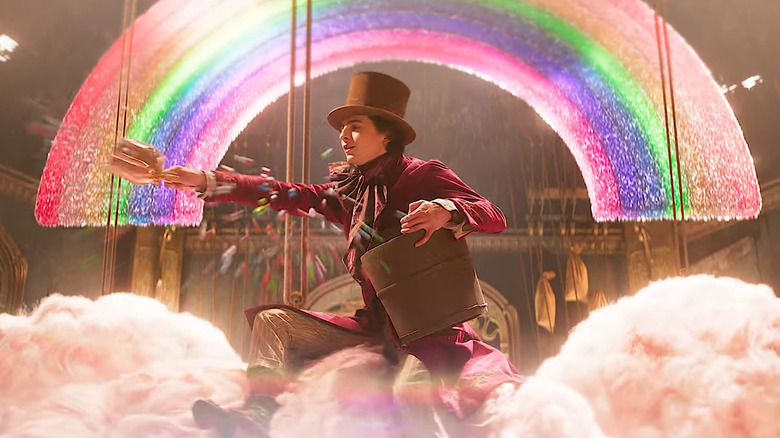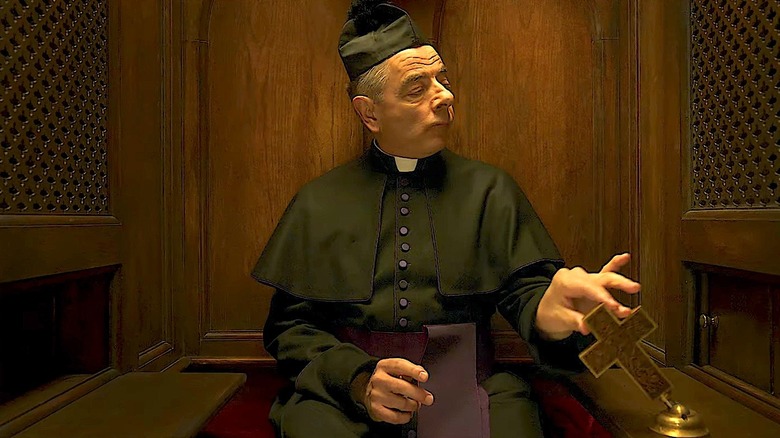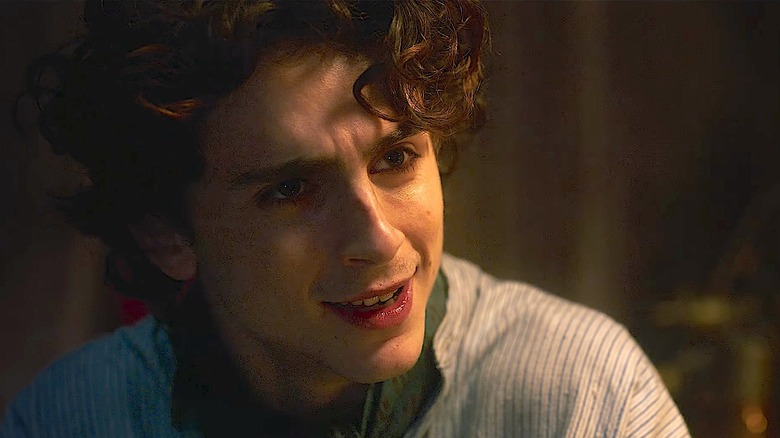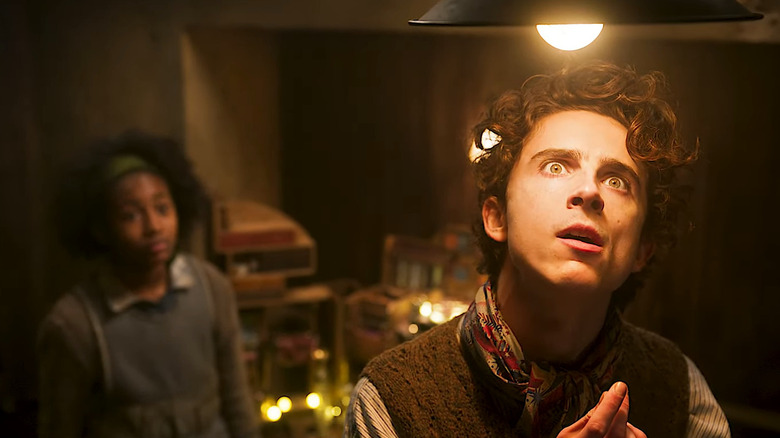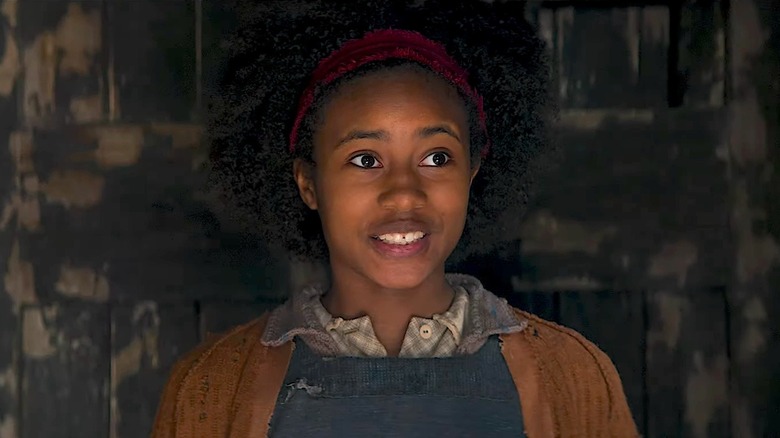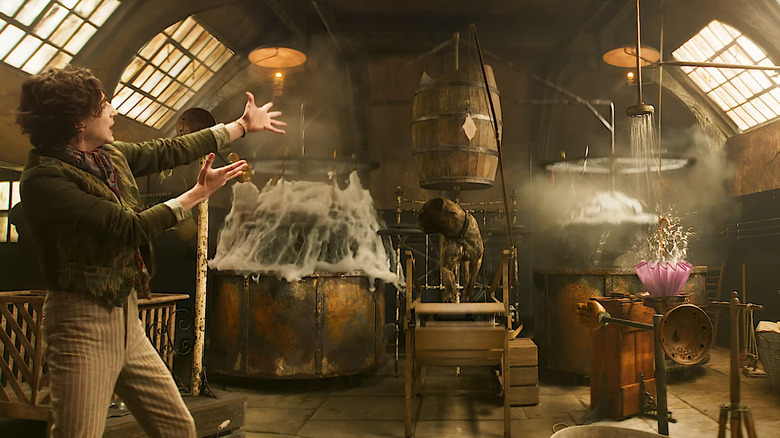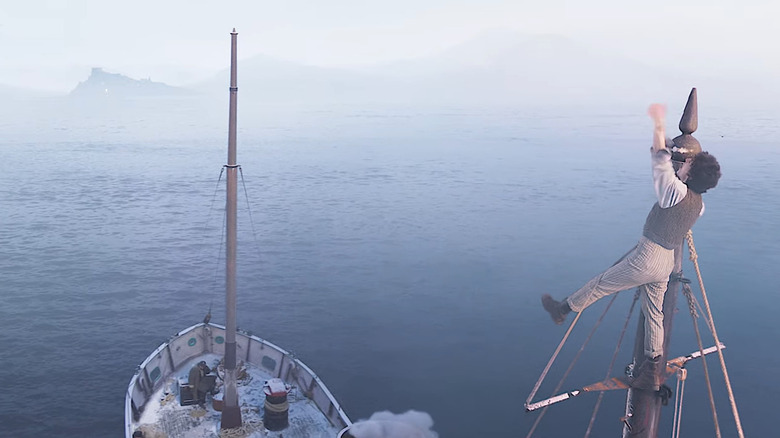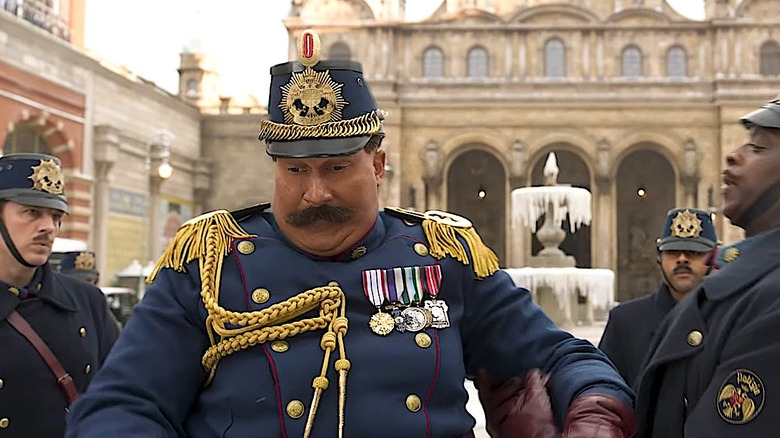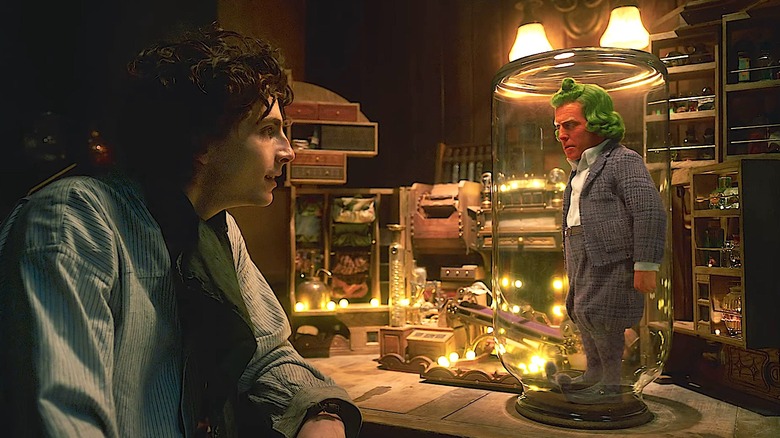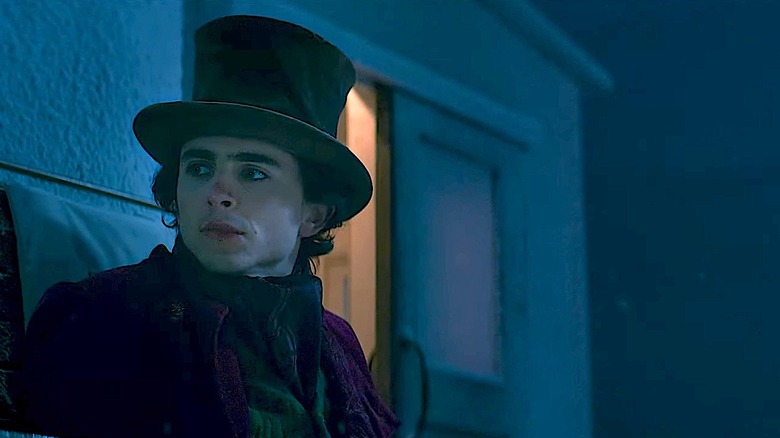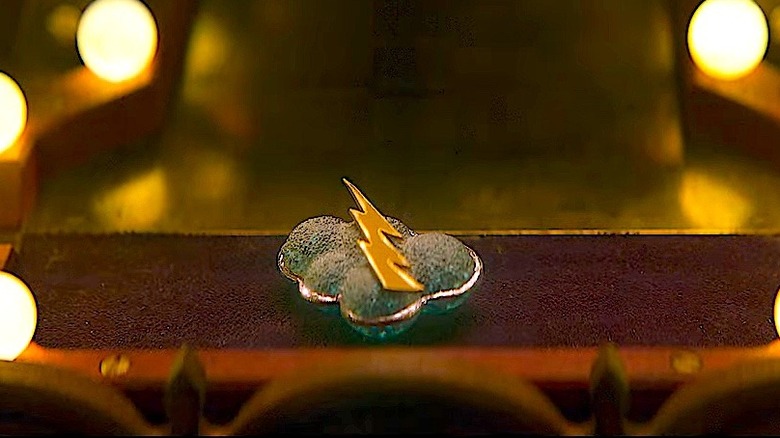Biggest Plot Holes In Wonka
Contains spoilers for "Wonka"
Welcome to the wonderful, whimsical world of "Wonka." This movie musical takes place 25 years before the events of the book that inspired the beloved 1971 version of "Charlie and the Charlie Factory." "Wonka" turns much of what we know about that film's Willy Wonka on its top-hatted head — for better or worse.
Starring Timothée Chalamet in the title role, "Wonka" is whimsical, delightful, heartfelt — and sweet enough to give you a toothache. But we'll trade basic dental health for a dose of cute comedy, gorgeous production design, and tearjerking flashbacks from the same writing team that gave us "Paddington 2."
"Wonka" is a cinematic confection that can delight families and single softies alike. It's movie magic powered by pure imagination. It doesn't need to be poked and prodded for plot holes, but we took a cynical page out of Roald Dahl's books and did it anyway — but all in good fun. Consider this list written in sparkly sour candy on a rainbow-colored strip of bubble gum. Read on for the biggest Wonkas in plot holes. Strike that, reverse it. Read on for the biggest plot holes in "Wonka."
Where does Wonka take place?
Willy opens the movie by scrambling up a ship's mast and offering up his hatful of chocolate to a city that will surely determine his fate. It's just not quite determined where that city is. The view from the ship and the docks is pure Victorian London. If you squint you just might make out the cast of "The Muppets Christmas Carol" or the kids from "Peter Pan."
Willy and Noodle (Calah Lane) also take a balloon ride over a pitched glass roof that calls to mind The Grand Palais and other Paris landmarks. The town market where Willy sells his wares could be straight out of "My Fair Lady" or even 19th-century Vienna. Vaguely Bavarian shopfronts decorate Willy's new home, and what look to be German words are written on street signs and corners. There's even a great cameo by the University of Oxford's Radcliffe Camera.
"That's very purposeful," Production Designer Nathan Crowley told Film Stories. Crowley, who often works with Christopher Nolan, says that the goal was to create a whimsical "best of Europe" look for the film. The combined location inspiration — and wild mix of accents used in the film — also calls to mind the 1971 movie's aesthetic and hodge-podge of American and English accents.
Willy's backstory
For an origin story, we don't get much of Willy Wonka's actual origin story in "Wonka" — but we do get some tender flashbacks on a houseboat. These scenes depict loving moments between young Willy, his mother, and a very precious bar of chocolate, made bean by bean over a ridiculously long period. Of course, these sweet scenes from Willy's youth pose far more questions than they answer.
Why are Willy and his mom on that houseboat? Are they on the run? And who is Willy's father — could he be someone they're on the run from? Is this houseboat life why young Willy spent years as a ship's cook in the run-up to "Wonka"?
One thing that's abundantly clear in these otherwise confounding flashbacks is that Willy's mother (Sally Hawkins) loves her son. But what exactly is her occupation? Is she an artist? A cook? A thief? A witch? Maybe she's a little of all of those — just like Willy Wonka himself.
Why doesn't the Chocolate Cartel try to recruit Willy Wonka?
Willy has his fair share of adversaries in "Wonka," including the terrible trio of Slugworth (Paterson Joseph), Prodnose (Matt Lucas), and Fickelgruber (Mathew Baynton). This craven crew is known as the Chocolate Cartel, a group so powerful that they have the police and the clergy on their payroll. They're even able to employ a woman to permanently guard their under-cathedral chocolate hoard.
But why does a bit of competition from an upstart like Willy scare the Chocolate Cartel so bad? And why don't they just try and recruit him? Is the Chocolate Cartel a commentary on the cartoonishly shortsighted and egocentric nature displayed by all captains of industry? Or do they just like ruining their own chocolate supply by drowning the occasional rival in it from time to time?
Either way, it seems like they should scoop Willy up rather than shut him down. Unless, of course, the Chocolate Cartel is cash-poor but chocolate-rich. Willy Wonka might just be the only man who can't be bought by chocolate, no matter how sweet the deal.
Why does Willy think his shop will protect him from the Chocolate Cartel?
When Willy first arrives at the Galeries Gourmet, he wheels and deals his wonderful flying hoverchocs to a thrilled crowd — and immediately puts a target on his back for the Chocolate Cartel.
The Chocolate Cartel bribes the chocoholic Chief of Police (Keegan-Michael Key) into threatening Wonka to leave town. However, Willy and his pals are a bit too clever for the Chocolate Cartel and the Chief. Willy sells his chocolates in the streets and evades capture long enough to earn rent for a storefront in the Galeries Gourmet — but just for one week.
Willy and his friends feel safe in a shop, but ... why? The whole police force and the Church is in the pocket of Big Chocolate. The Chocolate Cartel "poisons" Wonka Chocolate to make all of his customers look like "Trolls," and the angry customers burn Willy's shop to the ground. We get that Willy is a bit of a sweet fool, but he really should've stuck to the sewers and street carts if he wanted to avoid the long arm of the rotten law.
Who funds Willy's Galeries Gourmet shop?
Willy and his friends build a beautiful shop, complete with an epically huge chocolate cherry blossom tree, in the dead of night. But how? And who is bankrolling this operation?
"Wonka" operates on a delightful economy. But while delicious, it's a little tough to swallow that someone as ingenious and magical as Willy has a tough time coming up with cash when he's in a jam. We're not really complaining, though — it's easy enough to suspend disbelief when "Wonka" takes the time to literally suspend magical, delectable confections in mid-air.
But if Willy can bottle lightning, create "Silver Lining" candies, and build the most gorgeous candy shop Europe has ever seen with a couple of pals in just a few days — maybe he could also cook up a fake farthing or two to pay his way? A chocolate coin that the villains only discover is fake once they take a heavenly bite of it, perhaps?
Chocoholic Monks and the Chocolate Cartel
Look, we don't need to know how the Chocolate Cartel and the chocoholic monks teamed up to hide a vast store of chocolate underneath the city that the Chocolate Cartel runs. But ... we want to.
We also want to know more about the protections in place for that secret store of subterranean chocolate. From the Mistress of the Keys to the secret ledger compartments and the confession-chamber elevator, there is clearly a "John Wick" level backstory going on here. If this lore isn't going to be explored in another "Wonka" film, it's simply a sugar-coated shame.
Wouldn't chocoholic monks want to help Willy Wonka, rather than assist in his ruin? Again, poking holes in this logic feels like poking holes in those weird cherry chocolate bonbons everyone's great-aunties like — but we ask because we care. (And we want to see Willy battle chocoholic monks with weapons made of chocolate ganache.)
The illiteracy subplot
Willy not being able to read in "Wonka" is played for sincerity, rather than for a touch of himbo realness. And we have to ask — why? An illiteracy subplot in a movie that never has to even touch on literacy at all is a bold choice.
It seems the only reason Willy needs to be illiterate at all in the plot of "Wonka" is so the movie can make an admittedly funny gag about not reading the small print in contracts — and a nod to a different small print joke in "Willy Wonka and the Chocolate Factory." It also allows for Willy to make one more joke at the end of "Wonka," in a nice piece of ledger-related gotcha comedy.
The illiteracy subplot also provides a lovely opportunity for young Noodle to teach Willy to read, but this raises another big question — why didn't Willy's mom teach him to read? Was she too busy figuring out how to get the houseboat to run on autopilot? Or perhaps she was too occupied by teaching Willy how to make magical chocolate?
Gwennie and Basil
One of the most delightful gags in "Wonka" involves Basil, the Zoo Security Guard (Simon Farnaby, the co-screenwriter of "Wonka" and Julian on BBC "Ghosts"). Basil attempts to reconnect with an old flame after eating Willy's "Big Night Out" chocolate. Basil calls Gwennie, an old love from school, in an attempt to win her back. It doesn't work — at first.
Later, Willy and Noodle feed a "Big Night Out" chocolate to the dangerous Mistress of the Keys who guards the Chocolate Cartel's chocolate — and are delighted to discover she is Gwennie. The chocolate inspires her to call Basil up. It's all very adorable — unless you think about it too hard.
How do Gwennie and Basil, long-lost crushes who haven't seen each other in years and years, know each other's workplace phone numbers? You know what, we don't want to know. It spoils the magic. Anyone who truly cares about this plot hole loses their sweet treat privileges. No chocolate for you!
Noodle's ring
If Willy is the magical heart of "Wonka," Noodle is the movie's grounded soul. While Willy helps give Noodle a sense of play and wonder, Noodle helps Willy learn to read — and execute his chocolate-making schemes. Noodle is practical almost to a fault, so it makes us wonder — has she really never investigated her "N" signet ring, covered in conspicuous little Slugworth "S's," before?
Noodle is in love with books, letters, and dreams. She has the worst job in the world, and one that is extremely repetitive and boring. So are we to believe this curious, studious child who longs for a connection to family outside the wretched walls of Scrubitt and Bleacher's would never investigate the ring she has worn around her neck since birth?
Also, wouldn't the odious Mrs. Scrubitt (Olivia Colman) have ripped that valuable ring right off baby Noodle's neck? Even if Willy is the only one able to connect the "N" or "Z" ring to Slugworth at the end of the film, maybe the screenwriters didn't think about this — or maybe they didn't want to have to name their character "Zoodle."
Tiddles
Tiddles the Dog is the villainous Bleacher's (Tom Davis) trusty steed. He has a taste for mailman's pants, and wouldn't you know it — Willy wears just such a pair. Willy is irresistible to Tiddles and his fearsome teeth for this reason, but Willy uses the doggy bloodlust to his advantage.
He takes a patch of his pinstriped pants to create a Rube Goldberg-like device to distract Tiddles into running after the pants on a treadmill, thereby powering the launderette during the day — so Willy and his pals can dip out to sell chocolate instead.
But why doesn't Bleacher ever go looking for his sidekick pup during the day? Is he truly so distracted falling in love with Mrs. Scrubitt, in Bavarian aristocracy mode, that he has zero interest in man's best friend? Love causes momentary lapses of logic with us all, but doggone it — this plot hole is so deep, Tiddles could bury a bone in it.
Sovereigns
Willy begins "Wonka" singing about the 12 silver sovereigns in his pocket, enough to start a new life in a new city after a life at sea — but between the opening song and the high cost of living in his new land, he ends the scene with just one. Which he promptly drops down a storm grate.
When Willy is kindly invited to warm his cockles at Scrubbit and Bleacher's, he's offered a room at the cost of one sovereign a night. Small print aside, Willy seems to think this price is fair and usual. But later, when Willy opens his magical chocolate shop, all of the townsfolk gathered there are delighted that Willy "only" charges a single sovereign per piece of candy.
So ... is one Wonka chocolate worth the price of a hotel stay for one night? Probably, yeah. But who can afford such a price? According to "Wonka," Willy wants to make his chocolate available to the whole world — while still charging for it, of course, and having a storefront in the impossibly posh Galeries Gourmet. The sovereign-to-goods exchange rate is another plot puzzle of "Wonka" — and calls to mind the similarly wacky gold coin finances of the "John Wick" universe.
The fat suit
"Wonka" is a film that dazzles the eye, tickles the mind, and warms the heart. And then there is ... the fat suit. Original "Charlie and the Chocolate Factory" author Roald Dahl is famous for the mean streak of humor that runs through his books. The 1971 "Willy Wonka and the Chocolate Factory" represents some of this misanthropy in how unbothered Gene Wilder's Wonka is about possible factory-related child death.
But "Wonka" has no trace of any of this Dahlian dastardliness, which is what makes the fat suit the Chief of Police character wears jarring enough to feel like a plot hole — and also nonsensical. The chocoholic monks eat tons of chocolate, and the whole town is clearly addicted as well. But the only person who shows signs of weight gain due to chocolate consumption is the Chief of Police. His increasingly large fat suits comprise the movie's one mean joke, which is made all the nastier — and more odd — by how extreme the gag is.
The Oompa Loompa loophole
There is a lot of whimsy at play in "Wonka," but the introduction of the Oompa Loompa element is whimsical to the max. Oompa Loompa logic, even by "Wonka" standards, is thinner than the finest thread of cotton candy.
Willy insists to Noodle that a little orange man shows up in the night, right before sleep and waking, to steal his chocolate, every four weeks or so. This is a really specific schedule for a little orange thief, and one regularly ignored most of the movie, especially when outcast Oompa Loompa Lofty (Hugh Grant) shows up to save Willy and Noodle from the bad guys in the nick of time. But why? Does Lofty return quickly because he and Willy are so close to settling their debt?
We'll allow for the magic of Lofty knowing where Willy is when there's a chocolate debt to collect, but what's the deal with "Wonka" letting us know the "every four weeks or so" theft schedule if such a distinction actively works against the plot of "Wonka"? We can only assume the writers were sugar-high when they wrote that line.
How does this Willy become Wonka?
No one really expected sweet Timothée to fill Gene Wilder's Willy Wonka shoes in "Wonka." Chalamet is a wonderful actor in his own right, but he's doing a very different performance here, with a character written very differently than the one Wilder made famous.
Still, if Chalament's Wonka is a loving little sweetheart in "Wonka," what the heck happens to hurt him? Wilder's Wonka is as delightful as he is malicious. Is "Wonka" a sweet origin story before the stark horror movie that is "Willy Wonka and the Chocolate Factory"?
One could argue that the movies are totally separate, but they aren't, really — especially considering just how much the theme from the 1971 movie, "Pure Imagination," is used in the soundtrack to "Wonka." We're sure a possible sequel to "Wonka" will answer this burning question — and possibly break our hearts like so much peanut brittle in the process.
The curious case of the missing chocolate
For a movie about chocolate, it doesn't get a lot of screen time, aside from the fountain at the end, and some delightful treats that look way more like sculptural, colorful candy than easily recognizable chocolate bars. So where is the sweet stuff?
Well, the joke's on us. The intricately shaped candy in the movie that doesn't look a lot like chocolate, actually is chocolate: Chocolatier Gabriella Cugno made over 2,000 chocolates for the movie. "Any piece of chocolate you see, it's not wax," Keegan-Michael Key tells Vanity Fair. "It's not like they cut to a prop that looks like a piece of chocolate; the chocolatier made all of it. Sometimes, it was so delicious that I asked for an extra take."
Cugno's intricate bonbons are more in keeping with the general Old World Europe style of the film, rather than the 1971 "Willy Wonka and the Chocolate Factory" very American take on big old chocolate bars. Wildly, even the liquid chocolate that Willy and Noodle almost drown in was real. Director Paul King tells People, "We actually made an enormous vat of hot chocolate — not scalding, just warm hot chocolate for them to immerse themselves in." This just might be the most delicious "Wonka" plot hole that isn't truly a plot hole at all.
